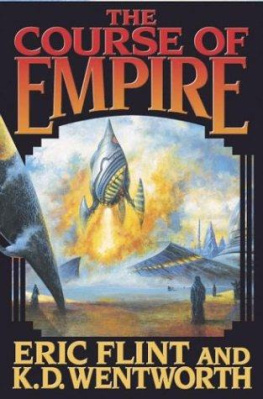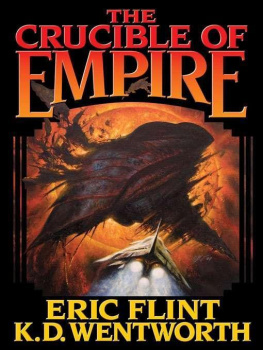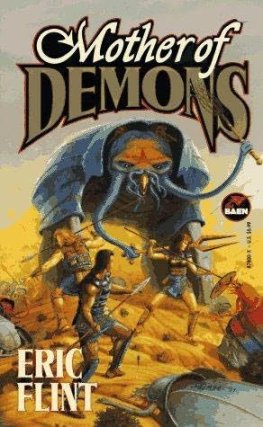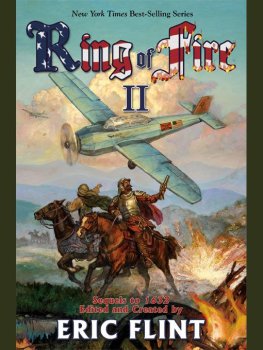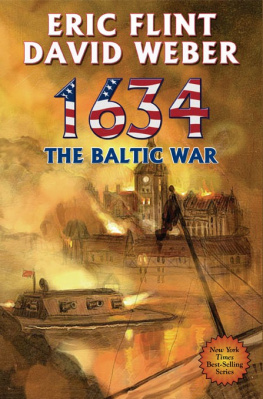Eric Flint - Destiny's shield
Here you can read online Eric Flint - Destiny's shield full text of the book (entire story) in english for free. Download pdf and epub, get meaning, cover and reviews about this ebook. genre: Science fiction. Description of the work, (preface) as well as reviews are available. Best literature library LitArk.com created for fans of good reading and offers a wide selection of genres:
Romance novel
Science fiction
Adventure
Detective
Science
History
Home and family
Prose
Art
Politics
Computer
Non-fiction
Religion
Business
Children
Humor
Choose a favorite category and find really read worthwhile books. Enjoy immersion in the world of imagination, feel the emotions of the characters or learn something new for yourself, make an fascinating discovery.

- Book:Destiny's shield
- Author:
- Genre:
- Rating:3 / 5
- Favourites:Add to favourites
- Your mark:
- 60
- 1
- 2
- 3
- 4
- 5
Destiny's shield: summary, description and annotation
We offer to read an annotation, description, summary or preface (depends on what the author of the book "Destiny's shield" wrote himself). If you haven't found the necessary information about the book — write in the comments, we will try to find it.
Destiny's shield — read online for free the complete book (whole text) full work
Below is the text of the book, divided by pages. System saving the place of the last page read, allows you to conveniently read the book "Destiny's shield" online for free, without having to search again every time where you left off. Put a bookmark, and you can go to the page where you finished reading at any time.
Font size:
Interval:
Bookmark:
Eric Flint
Destiny's Shield
Prologue


It was the Emperor's first public appearance since he had been acclaimed the new sovereign of Rome, and he was nervous. The ambassador from Persia was about to be presented to his court.
"He's going to be mean to me, Mommy," predicted the Emperor.
"Hush," whispered the Empress Regent. "And don't call me 'Mommy.' It's undignified."
The Emperor stared up at the tall imposing figure of his new mother, seated on her own throne next to him. Meeting her cold black eyes, he hastily looked away.
His new mother made him nervous, too. Even though his old mother said his new mother was a good friend, the Emperor wasn't fooled. The Empress Regent Theodora was not a nice lady.
The Empress Regent leaned over and whispered into his ear:
"Why do you think he'll be mean to you?"
The Emperor frowned.
"Well-because Daddy gave the Persians such a fierce whipping." Then, remembering: "My old daddy, I mean."
The Emperor glanced guiltily at the figure of his new father, standing not far away to his right. Then, meeting the sightless gaze of those empty sockets, he looked away. Very hastily. Not even his real mother tried to claim that Justinian was a "nice man."
Theodora, again, hissing:
"And don't call the Empire's strategos 'daddy.' It's not dignified, even if he is your stepfather."
The Emperor hunched down on his throne, thoroughly miserable.
It's too confusing. Nobody should have this many mommies and daddies.
He began to turn his head, hoping to catch a reassuring glimpse of his real parents. He knew they would be standing nearby, among the other high notables of the Roman court. But the Empress
Regent hissed him still.
"Stop fidgeting! It's not regal."
The Emperor made himself sit motionless. He grew more and more nervous, watching the stately advance of the Persian ambassador down the long aisle leading to the throne.
The Persian ambassador, he saw, was staring at him. Everybody was staring at him. The throne room was packed with Roman officials, every one of whom had their eyes fixed on the Emperor. Most of them, he thought, were not very nice-judging, at least, from sarcastic remarks he had heard his parents make. All four of his parents. The scurrilous nature of officialdom was one of the few subjects they did not quarrel about.
The ambassador was now much closer. He was rather tall, and slender of build. His complexion was perhaps a bit darker than that of most Greeks. His face was lean-jawed and aquiline, dominated by a large nose. His beard was cut in the short square style favored by Persians.
The ambassador was wearing the costume of a Persian nobleman. His gray hair was capped by the traditional gold-embroidered headdress, which Persians called a citaris. His tunic, though much like a Roman one, had sleeves which reached all the way down to the wrists. His trousers also reached far down, almost covering the red leather of his boots.
Seeing the bright color of the ambassador's boot-tips, the Emperor felt a momentary pang. His old father-his real father-had a pair of boots just like those. "Parthian boots," they were called. His father favored them, as did many of his Thracian cataphracts.
The ambassador was now close enough that the Emperor could make out his eyes. Brown eyes, just like his father's. (His old father; his new father had no eyes.)
But the Emperor could detect none of the warmth which was always in his old father's eyes. The Persian's eyes seemed cold to him. The Emperor lifted his gaze. High above, the huge mosaic figures on the walls of the throne room stared down upon him. They were saints, he knew. Very holy folk. But their eyes, too, seemed cold. Darkly, the Emperor suspected they probably hadn't been very nice either. The severe expressions on their faces reminded him of his tutors. Sour old men, whose only pleasure in life was finding fault with their charge.
He felt as if he were being buried alive.
"I'm hot," he complained.
"Of course you're hot," whispered Theodora. "You're wearing imperial robes on a warm day in April. What do you expect?"
Unkindly:
"Get used to it." Then:
"Now, act properly. The ambassador is here."
Twenty feet away, the Persian ambassador's retinue came to a halt. The ambassador stepped forward two paces and prostrated himself on the thick, luxurious rug which had been placed for that purpose on the tiled floor of the throne room.
That rug, the Emperor knew, was only brought out from its special storage place for the use of envoys representing the Persian King of Kings, the Shahanshah. It was the best rug the Roman Empire owned, he had heard.
Persia was the traditional great rival of the Roman Empire. It wouldn't do to offend its representatives. No, it wouldn't do at all.
The Persian ambassador was rising. Now, he was stepping forward. The ambassador extended his hand, holding the scroll which proclaimed his status to the Roman court. The motion brought a slight wince to the face of the ambassador, and the Roman Emperor's fear multiplied. The wince, he knew, was caused by the great wound which the ambassador had received to his shoulder three years before.
The Emperor's real father had given him that wound, at a famous place called Mindouos.
He's going to be mean to me.
"I bring greetings to the Basileus of Rome from my master Khusrau Anushirvan, King of Kings of Iran and non-Iran."
The ambassador spoke loudly, so everyone in the huge throne room could hear. His voice was very deep, as deep as anyone's the Emperor had ever heard except church singers.
"My name is Baresmanas," continued the ambassador. "Baresmanas, of the Suren."
The Emperor heard a whispering rustle sweep the throne room. He understood the meaning of that rustle, and felt a moment's pride in his understanding. For weeks, now, his tutors had drilled him mercilessly in the history and traditions of Persia. The Emperor had not forgotten his lessons.
Officially, the Suren were one of the sahrdaran, the seven greatest noble families of Persia. Unofficially, they were the greatest. Rustam, the legendary hero of the Aryans-their equivalent of Hercules-was purported to have been of that family. And the Persian general who shattered Crassus' Roman army at Carrhae had been a Suren.
Sending a Suren ambassador, the Emperor knew, was the Shahanshah's way of indicating his respect for Rome. But the knowledge did not allay his fear.
He's going to be mean to me.
The stern, haughty, aristocratic face of the Persian ambassador broke into a sudden smile. White teeth flashed in a rich, well-groomed beard.
"It is a great pleasure to meet you, Your Majesty," said the ambassador. Baresmanas bowed toward Theodora. "And your mother, the Regent Theodora."
The Emperor reached out his hand to take the scroll. After unrolling the parchment, he saw with relief that the document was written in Greek. The Emperor could read, now, though still with no great facility. And this document was full of long-winded words that he didn't recognize at all. He began studying it intently until he heard a slight cough.
Out of the corner of his eye, the Emperor saw the Empress Regent nodding graciously. Remembering his instructions, the Emperor hastily rolled up the parchment and followed her example. Then, seeing the hint of a frown on Theodora's brow, he belatedly remembered the rest of her coaching.
Font size:
Interval:
Bookmark:
Similar books «Destiny's shield»
Look at similar books to Destiny's shield. We have selected literature similar in name and meaning in the hope of providing readers with more options to find new, interesting, not yet read works.
Discussion, reviews of the book Destiny's shield and just readers' own opinions. Leave your comments, write what you think about the work, its meaning or the main characters. Specify what exactly you liked and what you didn't like, and why you think so.



